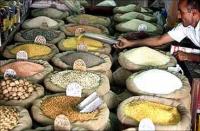 F
Food inflation may have dropped to single digit but since that fall is set against last year's elevated double-digit base, it continues to hurt the poor - 65 per cent of their disposable income goes towards food.
The government often defends its failure to tame inflation by arguing that it has no magic wand to bring down prices.
But this plea is as vague as it is evasive since several administrative and policy measures are available to tame food prices in the short as well as the long run.
Unfortunately, result-oriented action has not been forthcoming. At times, high global food inflation is also held responsible as one contributory factor to domestic food inflation. However, this is not wholly true for many food items.
Remember that when world food prices were recording new highs between 2007 and early 2008, India remained more or less unaffected.
On the other hand, when global prices began to ease, domestic food inflation started to soar relentlessly - so much so that it crossed the 20-per cent mark at least twice, in December 2009 and February 2010.
Though the prices of staple cereals (wheat and rice) have been stable in recent months, overall inflation has remained high owing to an escalation in the prices of high-value foods such as vegetables, fruit, milk, eggs, meat, fish and so on.
No doubt the output of almost all these commodities has been growing much faster than that of cereals for several years, but their demand is now outpacing the increase in production.
These and many other macro and micro trends in food inflation over the past decade have been captured vividly in a recent policy brief issued by the New Delhi-based National Centre for Agricultural Economics and Policy Research.
The report has been put together jointly by two experts from NCAP - director Ramesh Chand and P Shinoj - and two from the International Food Policy Research Institute - Ashok Gulati, who has joined as chairman of the Commission on Agricultural Costs and Prices, and Kavery Ganguly.
Interestingly, this paper has hinted that foodgrain mismanagement (read excessive stockholding and inefficient distribution system) and imprudent trade decisions might be responsible for supply-side constraints affecting food inflation.
In the case of high-value goods, fragmented markets and want of efficient linkage between production and down-the-chain
consumption systems have been held responsible for price volatility.
"The problem lies not so much with production as with post-harvest losses and wastage due to lack of advanced supply chain infrastructure to ensure smooth delivery from farms to markets and finally to consumers," the policy paper points out.
To overcome supply-side pressures, the paper suggests drawing on foodgrain inventories and facilitating liberal imports by lowering, or waiving, duties on fruit and vegetables.
However, reliable commercial intelligence concerning the demand-supply situation is imperative for taking decisions on these issues.
Besides, a commercial intelligence agency can be set up to warn against impending price spirals, which, in turn, could trigger remedial action.
For price stability in the long term, it has suggested reforms in the mandi system, aimed at minimising the role of intermediaries between producers and consumers.
Fruit and vegetables can be freed from the obligation of trading through the mandis run by the agricultural produce marketing committees.
Eliminating mandi fee and agents' commissions through direct linkages between producers and retailers or buyers can help reduce transaction costs. It will benefit both producers and consumers.
Also, value-added tax can replace state taxes on primary farm produce. Besides, obstacles in the movement of farm commodities need to be removed to achieve the long-pending objective of creating a single countrywide market for agricultural produce.
This apart, there is an urgent need to remove hurdles in private investment in agri-marketing to facilitate greater competition. Also, it is important to spur the development of high-value chains including warehousing, cold storage and vital back-end services for farmers.
Private mandis can facilitate competition in the country's traditional markets.
All this points to the need for agriculture reforms, which have remained elusive in the two decades after India initiated economic reforms.
The entire chain of agri-business activities, from input supplies to logistics, processing and marketing, needs to be revamped.
surinder.sud@gmail.com
 Food inflation may have dropped to single digit but since that fall is set against last year's elevated double-digit base, it continues to hurt the poor - 65 per cent of their disposable income goes towards food.
Food inflation may have dropped to single digit but since that fall is set against last year's elevated double-digit base, it continues to hurt the poor - 65 per cent of their disposable income goes towards food.